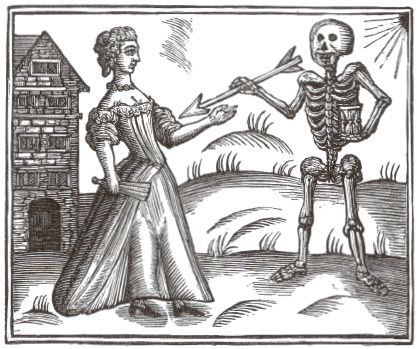
VIII
Cruel Death Has Put an End …
Songs of Death and Destruction
Cruel Death Has Put an End …
Songs of Death and Destruction
After nineteen years’ experience of the patter and paper line in the streets, I find that a foolish nonsensical thing will sell twice as fast as a good moral sentimental one; and, while it lasts, a good murder will cut out the whole of them. It’s the best selling thing of any. I used at one time to patter religious tracts in the street, but I found no encouragement.
So said a broadside seller to Henry Mayhew in the late 1840s (Mayhew, London Labour and the London Poor (1861) I, p. 235).
People of all ages have probably always loved a ‘good murder’, but from the mid eighteenth to the late nineteenth centuries a veritable ‘murder industry’ developed which was fuelled by social changes such as the expansion of transport networks and the availability of cheap printed materials. Not only did thousands flock to see the regular public hangings (abolished in 1868), which were enjoyed as great family outings, but they also visited crime scenes and other associated places where there was always an owner or a neighbour willing to show the very room, and point out the bloodstains. For a really well-known crime, such as the murder of Maria Marten at the Red Barn, you could even buy souvenir ceramic models of the building and the key players to display on your mantlepiece.
Everyone followed the course of particular cases in newspapers and on broadsides, which reported each crime in minute detail, but both the legitimate press and street hacks were quite happy to include spurious details based on rumour and prejudice, and it is often difficult for modern researchers to sort out fact from fiction. Melodramas, puppet shows, peep shows, waxworks, print-sellers and countless other manifestations of popular culture quickly followed and cashed in on the latest sensation, keeping it in the public eye for a considerable time after the real perpetrator met his or her fate. The broadsides and the stage shows often included songs written for the occasion.
But despite wide dissemination, few of the songs written about real murders seem to have lasted in singers’ repertoires (‘Maria Marten’, No. 123, is an exception), and traditional singers seem to have preferred the generic fictional cases, of which the ‘murdered sweetheart’ songs are an important subcategory. ‘The Cruel Ship’s Carpenter’ (No. 117), ‘Mary in the Silvery Tide’ (No. 125) and ‘The Oxford Girl’ (No. 129) are examples included here, but there were many others.
Child ballads also include more than their fair share of violence, and ‘The Cruel Mother’ (No. 116), ‘Hugh of Lincoln’ (No. 119) and ‘The Outlandish Knight’ (No. 127) each focuses on a different variety of human mortality, but for pure Gothic horror in song, nothing beats ‘Lambkin’ (No. 121).
Not all deaths in folk song were murders, of course. Many songs focused on shipwrecks and other disasters, executions or personal accidents (‘The Lakes of Cold Finn’, No. 120, and ‘The Mistletoe Bough’, No. 126), or used unexplained deaths as an element in a tragic love story (‘The Trees They Do Grow High, Part III, No. 55; ‘Lord Lovel’, No. 122; and ‘The Unquiet Grave’, No. 130).
115
The Constant Farmer’s Son
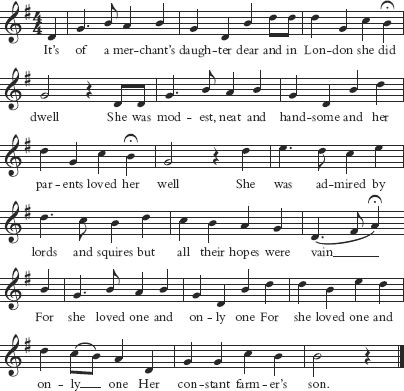
It’s of a merchant’s daughter dear and in London she did dwell
She was modest, neat and handsome and her parents loved her well
She was admired by lords and squires but all their hopes were in vain
For she loved one and only one
For she loved one and only one
Her constant farmer’s son.
Her parents they consented, but her brothers they said nay
So they asked young William’s company with them to spend the day
But mark, returning home again, how soon his race was run
For with a stake the life did take
For with a stake the life did take
Of her constant farmer’s son.
As Mary on her pillow lay she had a dreadful dream
She dreamt she saw his body laid down by some crystal stream
Then she arose, put on her clothes, to seek her love did go
It’s dead and cold she did behold
It’s dead and cold she did behold
Her constant farmer’s son.
With those cold tears all on his cheeks and mingled with his gore
She strived in pain to ease her pain, she kissed him ten times o’er
She gathered the green leaves from the trees to keep him from the sun
A night and day she passed away
A night and day she passed away
With her constant farmer’s son.
Now hunger came creeping o’er the poor girl and homeward she did go
[To try to find his murderers she straightway home did go]
Saying, ‘Parents dear, you soon shall hear, what a dreadful deed was done
In yonder vale lies dead and pale
In yonder vale lies dead and pale
My constant farmer’s son.’
Up spoke the younger brother and he said, ‘It was not I.’
The same replied the elder one, and he swore most bitterly
Young Mary said, ‘Don’t turn red, nor try the law to shun
You have done the deed and you shall bleed
You have done the deed and you shall bleed
For my constant farmer’s son.’
116
The Cruel Mother
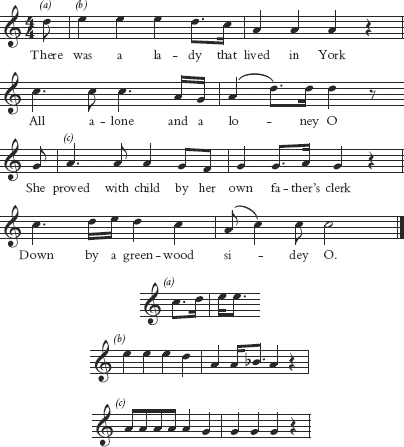
There was a lady that lived in York
All alone and a loney O
She proved with child by her own father’s clerk
Down by a greenwood sidey O.
As she was walking down her father’s lawn, etc.
She thought three times that her back would be broke, etc.
As she was walking down her father’s lawn, etc.
She says, ‘Honourable Mary, pity me’, etc.
As she was walking down her father’s lawn, etc.
Where her fine sons they were born, etc.
She pulled out her long penknife, etc.
And there she took away their three lives, etc.
Years went by and one summer’s morn, etc.
She saw three boys they were playing bat and ball, etc.
‘O my fine boys, if you were mine’, etc.
‘Sure I’d dress you up in silk so fine’, etc.
‘O mother dear, when we were yours’, etc.
‘You did not dress us in silk so fine’, etc.
‘You pulled out your long penknife’, etc.
‘And there you took away our three lives’, etc.
‘O my fine boys, what will become of me?’, etc.
‘You’ll be seven long years a bird in a tree’, etc.
‘You’ll be seven long years a tongue in a bell’, etc.
And you’ll be seven long years a porter in hell’, etc.
117
The Cruel Ship’s Carpenter
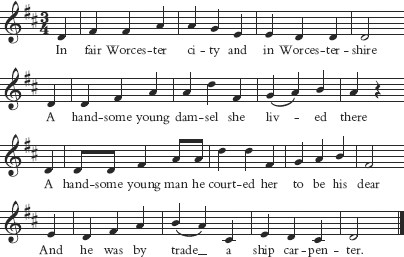
In fair Worcester city and in Worcestershire
A handsome young damsel she liv-ed there
A handsome young man he courted her to be his dear
And he was by trade a ship carpenter.
Now the King wanted seamen to go on the sea
That caused this poor damsel to sigh and to say
‘O William, O William, don’t you go to sea
Remember the vows that you made to me.’
It was early next morning before it was day
He went to his Polly, these words he did say
‘O Polly, O Polly, you must go with me
Before we are married my friends for to see.’
He led her through groves and valleys so deep
And caused this young damsel to sigh and to weep
‘O William, O William, you have led me astray
On purpose my innocent life to betray.’
‘It’s true, it’s true,’ these words he did say
‘For all the long night I’ve been digging your grave’
The grave being open, the spade standing by
Which caused this young damsel to sigh and to cry.
‘O William, O William, O pardon my life
I never will covet to be your wife
I will travel the world over to set you quite free
O pardon, O pardon, my baby and me.’
‘No pardon I’ll give, there’s no time for to stand’
So with that he had a knife in his hand
He stabbed her heart till the blood it did flow
Then into the grave her fair body did throw.
He covered her up so safe and secure
Thinking no one would find her he was sure
Then he went on board to sail the world round
Before that the murder could ever be found.
It was early one morning before it was day
The captain came up, these words he did say
‘There’s a murderer on board, and he it lately has done
Our ship is in mourning and cannot sail on.’
Then up stepped one, ‘Indeed it’s not me.’
Then up stepped another the same he did say
Then up starts young William to stamp and to swear
‘Indeed it’s not me, sir, I vow and declare.’
As he was turning from the captain with speed
He met his Polly, which made his heart bleed
She stript him, she tore him, she tore him in three
Because he had murdered her baby and she.
118
Edwin in the Lowlands Low
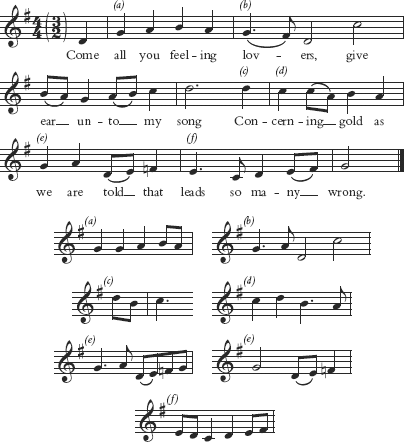
Come all you feeling lovers, give ear unto my song
Concerning gold as we are told that leads so many wrong.
Young Emma was a servant maid; her love a sailor bold
He ploughed the main much gold to gain for his love as we are told.
Young Emma she would daily mourn since Edmund first did roam
And seven years have passed away since Edmund left his home.
He went up to young Emma’s house his gold all for to show
What he had gained all on the main and down in the lowlands low.
‘Oh my father keeps a public inn that stands down by the sea
And go you there, young Edmund, and there this night shall be.’
‘I will meet you in the morning, love, don’t let my parents know
That your name it is young Edmund who ploughs the lowlands low.’
As young Edmund he sat drinking until time to go to bed
But little was he thinking what sorrows crowned his head.
As soon as he had got to bed and scarcely got to sleep
When Emma’s cruel father into his bedroom creep.
He robb-ed him, he stabb-ed him, until the blood did flow
And he sent his body a-rolling down in the lowlands low.
As young Emma she lay sleeping, she dreamt a dreadful dream
She dreamt she saw her own true love and the blood appeared in streams.
Young Emma got up at daybreak, down to her home did go
Because she loved him dearly, who ploughed the lowlands low.
‘Oh father, dearest father, now tell me, I entreat
Oh where is that young man who came last night to sleep?’
‘Oh Emma, dearest Emma, his gold will make a show
And I’ve sent his body a-rolling down in the lowlands low.’
‘Oh father, cruel father, you shall die a public show
For murdering of my own true love, who ploughed the lowlands low.’
‘Now the shells all in the ocean shall make my true love’s bed
And the fish that swim all in the sea shall swim around his head.’
Faint, sick and broken-hearted to bed the maid did go
And her shrieks were of young Edmund who ploughed the lowlands low
[spoken] Lowlands low.
119
Hugh of Lincoln
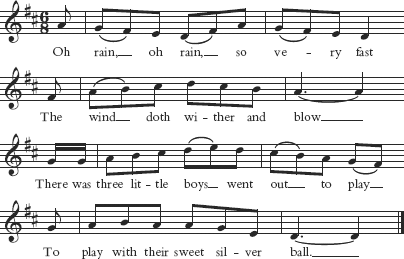
Oh rain, oh rain, so very fast
The wind doth wither and blow
There was three little boys went out to play
To play with their sweet silver ball.
They tossed him high, they tossed him low
They tossed him over into the Jew’s garden
The very first of them that did come out
The Jewess, was dressed in green.
‘Come in, come in, you little Sir Hugh
Come in and fetch your ball.’
‘I can’t come in, nor I won’t come in
Without my playmates all.’
At first she showed me an apple so red
And next was a diamond ring
Next was the cherry so red as blood
And so she got me in.
She set me into a silver chair
And fed me with sugar so sweet
She laid me on the dressing board
And stuck me like a sheep.
She throwed me into a new-dug well
It was forty cubits deep
She wropped me up in a red mantle
Instead of a milk-white sheet.
’Twas up and down the garden there
This little boy’s mammie did run
She had a little rod all under her apron
To beat her little son home.
‘Oh here I am, dear mother,’ he cried
‘My grave is dug so deep
The pen-knife sticks so close to my heart
So ’long with you I can’t sleep.’
120
The Lakes of Cold Finn
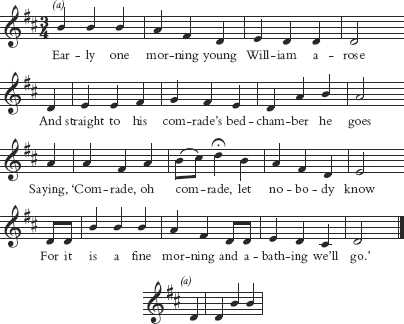
Early one morning young William arose
And straight to his comrade’s bedchamber he goes
Saying, ‘Comrade, oh comrade, let nobody know
For it is a fine morning and a-bathing we’ll go.’
Young William tripped off till he came to Long Lane
The first that he met was a keeper of game
He advised him for sorrow to turn back again
For the lakes of cold water is the lakes of Cold Finn.
Young William stripped off and he swum the lake round
He swum round the island but not to right ground
Saying, ‘Comrade, oh comrade, don’t you venture in
For the depths of cold water are the lakes of Cold Finn.’
Early that morning his sister arose
And straight to her mother’s bedchamber she goes
Saying, ‘Mother, oh mother, I had a sad dream
That young William was floating on the watery stream.’
Early that morning his mother went there
She’d rings on her fingers and was tearing her hair
Saying, ‘Where was he drownded, or did he fall in?
For the depths of cold water is the lakes of Cold Finn.’
The day of his funeral there shall be a grand sight
Four and twenty young men all dressed up in white
They shall carry him along and lay him on clay
Saying, ‘Adieu to young William’, they’ll all march away.
121
Lambkin

Says the lord unto the lady
‘I’m a-going away from home
Beware of false Lambkin
Until I return.’
‘What cares I for Lambkin
Or any of his kin?
While the doors they are fastened
And darkened within.’
As soon as my lordy
He was got out of sight
Then ready was that cruel Lambkin
To visit her that night.
He rapp-ed at the door
Says, ‘Nurse, let me in
I’ll make you a lady
And visit you in.’
He pinched that poor baby
For to make that for to cry
While Nurse sat a-singing
‘Hush! hush-a by bye.’
So they pinched that poor baby
For to make that for to cry
While Nurse sat a-singing
Hush! hush-a by bye.
‘I cannot keep it good, ma’am
With milk or with pap
So I pray you, kind lady
Come and nurse it in your lap.’
‘How can I come down, nurse
At this time of the night
When there’s no fire a-burning
Nor candle give light?’
‘Put on your golden mantle
That will give you light
And I pray you, kind lady
Come and nurse it your lap tonight.’
She put on her golden mantle
Not thinking any harm
And Lambkin was ready
To catch her in his arms.
‘Brother Lambkin, Brother Lambkin
Spare my life till ten o’clock
I’ll give you as many guineas
As you can carry in your sack.’
‘I want none of your guineas, love
I want none of your gold
For I want to see your heart’s blood
Come trinkling quite cold.’
‘Brother Lambkin, Brother Lambkin
Spare my life till ten o’clock
You shall have my daughter Betsy
As is up in the top.’
‘You may fetch your daughter Betsy
She may do you some good
She may hold the silver basin
For to catch your heart’s blood.’
There’s blood in the kitchen
And there’s blood in the hall
And there’s blood in the parlour
Where the lady did fall.
As Betsy was a-looking
Out of the tower so high
She saw her worried father
A-coming riding by.
‘Worried father! Worried father
Don’t lay the blame on me
It was that cruel Lambkin
That murdered lady and baby.’
And Lambkin is a-hanging
On the high gallows tree
And the nurse is a-burning
In the fire close by.
Oh the death bell is a-knelling
For lady and baby
And the green grass is a-growing
All over they
And the green grass is a-growing
All over they.
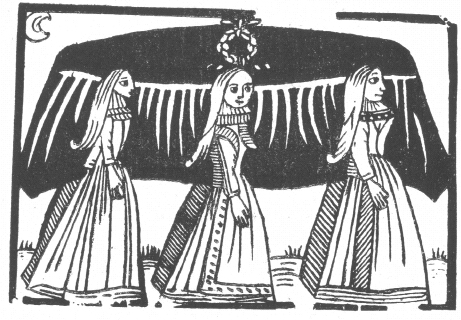
122
Lord Lovel
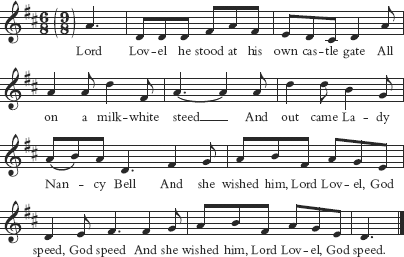
Lord Lovel he stood at his own castle gate
All on a milk-white steed
And out came Lady Nancy Bell
And she wished him, Lord Lovel, God speed, God speed
And she wished him, Lord Lovel, God speed.
‘Oh where are you going, Lord Lovel?’ she cried
‘Oh where are you going?’ cried she
‘I’m going, sweet Lady Nancy Bell
Strange countries for to see, to see
Strange countries for to see.’
‘When will you come back, Lord Lovel?’ she cried
‘When will you come back?’ cried she
‘In a year or two, or three at the most
And I’ll return to my Lady Nancy, Nancy
I’ll return to my Lady Nancy.’
He hadn’t been gone but a year and one day
Strange countries for to see
When all at once came into his mind
I’ll return to my Lady Nancy, Nancy
I’ll return to my Lady Nancy.
He mounted on his milk-white steed
And rode to London town
And there he saw a funeral
And the people were weeping around, around
And the people were weeping around.
123
Maria Marten
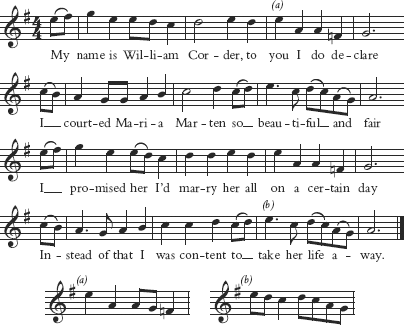
My name is William Corder, to you I do declare
I courted Maria Marten so beautiful and fair
I promised her I’d marry her all on a certain day
Instead of that I was content to take her life away.
I went unto her father’s house on the eighteenth day of May
He said, ‘I’ve come, my dearest Maria, we’ll fix the wedding day
If you’ll meet me at the Red Barn floor as sure as you’re alive
I’ll take you down to Ipswich Town and make you my dear bride.’
He straight went home and fetched his gun, his pickaxe and his spade
He went unto the Red Barn floor and he dug poor Maria’s grave
This poor girl she thought no harm but to meet him she did go
She went into the Red Barn floor and he laid her body low.
Her mother dreamt three dreams one night, she ne’er could get no rest
She dreamed she saw her daughter dear lay bleeding at the breast
Her father went into the barn and up the boards he took
There he saw his daughter dear lay mingled in the dust.
Now all young men do you beware, take a pity look on me
For the time is past to die at last all on the gallus tree.
124
Mary Across the Wild Moor
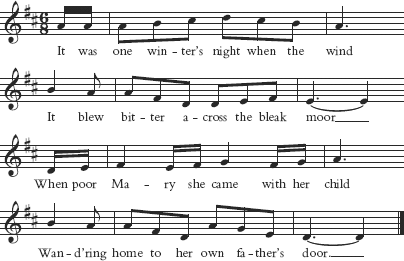
It was one winter’s night when the wind
It blew bitter across the bleak moor
When poor Mary she came with her child
Wand’ring home to her own father’s door.
She cried, ‘Father, O pray let me in
Do come down and open your own door
Or the child at my bosom will die
With the wind that blows on the wild moor.’
‘Why ever did I leave this cot
Where once I was happy and free
Doomed to roam without friend or home
O father, have pity on me.’
But her father was deaf to her cry
Not a voice nor a sound reached the door
But the watch dog’s bark and the wind
That blew bitter across the wild moor.
Now think what her father he felt
When he came to the door in the morn
And found Mary dead, and her child
Fondly clasped in its dead mother’s arms.
Wild and frantic he tore his grey hairs
As on Mary he gazed at the door
Who on the cold night there had died
By the wind that blew on the wild moor.
Now her father in grief pined away
The poor child to its mother went soon
And no one lived there to this day
And the cottage to ruin has gone.
The villagers point to the spot
Where the willow droops over the door
They cry out there poor Mary died
With the wind that blew o’er the wild moor.
125
Mary in the Silvery Tide
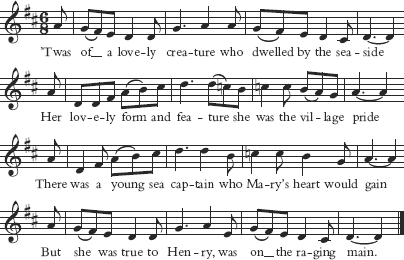
’Twas of a lovely creature who dwelled by the seaside
Her lovely form and feature she was the village pride
There was a young sea captain who Mary’s heart would gain
But she was true to Henry, was on the raging main.
’Twas in young Henry’s absence this nobleman he came
A-courting pretty Mary, but she refused the same
She said, ‘I pray you begone, young man, your vows are all in vain
Therefore begone, I love but one, he’s on the raging main.’
With mad desperation this nobleman he said
‘To prove the separation I’ll take her life away
I’ll watch her late and early and then alone,’ he cried
‘I’ll send her body a-floating in the rippling silvery tide.’
This nobleman was walking out to take the air
Down by the rolling ocean he met the lady fair
He said, ‘My pretty fair maid, you consent to be my bride
Or you shall swim far, far from here in the rolling silvery tide.’
With trembling limbs cried Mary, ‘My vows I never can break
For Henry I dearly love and I’ll die for his sweet sake.’
With his handkerchief he bound her hands and plunged her in the main
And shrinking her body went floating in the rolling silvery tide.
It happened Mary’s true love soon after came from sea
Expecting to be happy and fixed the wedding day
‘We fear your true love’s murdered,’ her aged parents cried
‘Or she caused her own destruction in the rolling silvery tide.’
As Henry on his pillow lay he could not take no rest
For the thoughts of pretty Mary disturbed his wounded breast
He dreamed that he was walking down by a riverside
He saw his true love weeping in the rolling silvery tide.
Young Henry rose at midnight, at midnight gloom went he
To search the sandbanks over down by the raging sea
At daybreak in the morning poor Mary’s corpse he spied
As to and fro she was floating in the rolling silvery tide.
He knew it was his Mary by the ring on her hand
He untied the silk handkerchief which put him to a stand
For the name of her cruel murderer was full thereon he spied
Which proved who ended Mary’s days in the rolling silvery tide.
This nobleman was taken, the gallus was his doom
For ending pretty Mary’s days, she had scarce attained her bloom
Young Henry broken-hearted he wandered till he died
His last words was for Mary in the rolling silvery tide.
126
The Mistletoe Bough
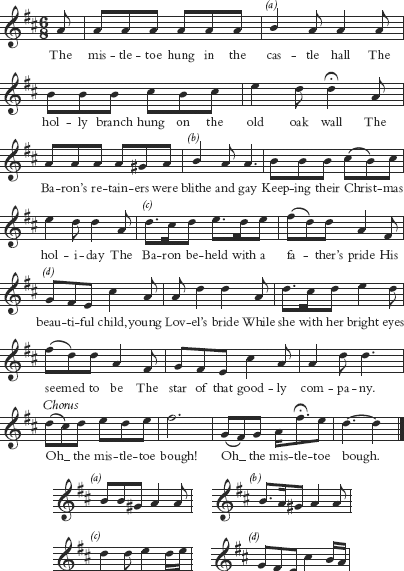
The mistletoe hung in the castle hall
The holly branch hung on the old oak wall
The Baron’s retainers were blithe and gay
Keeping their Christmas holiday
The Baron beheld with a father’s pride
His beautiful child, young Lovel’s bride
While she with her bright eyes seemed to be
The star of that goodly company.
Chorus
Oh the mistletoe bough!
Oh the mistletoe bough.
‘I’m weary of dancing now,’ she cried
‘Here tarry a moment, I’ll hide, I’ll hide
And Lovel be sure thou’rt the first to trace
The clue to my secret hiding place.’
Away she ran and her friends began
Each tower to search and each nook to scan
And young Lovel cried, ‘Oh where dost thou hide?
I’m lonesome without thee, my own dear bride.’
They sought her that night, they sought her next day
They sought her in vain till a week passed away
In the highest and the lowest and the loneliest spot
Young Lovel sought wildly but found her not
And years flew by and their grief at last
Was told as a sorrowful tale long past
When Lovel appeared the children cried
‘See the old man weeps for his fairy bride.’
At length an old chest that had long lain hid
Was found in the castle, they raised the lid
A skeleton form lay mouldering there
In the bridal wreath of a lady fair
Oh sad was her fate in sporting jest
She hid from her lord in the old oak chest
It closed with a spring and her bridal bloom
Lay withering there in the living tomb.
127
The Outlandish Knight
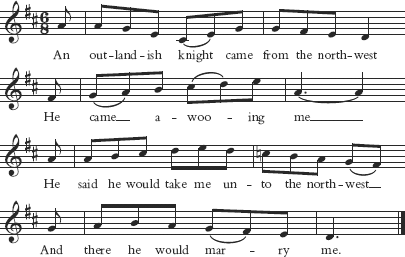
An outlandish knight came from the north-west
He came a-wooing me
He said he would take me unto the north-west
And there he would marry me.
‘Go fetch me some of your father’s gold
And some of your mother’s fee
And two of the best nags out of the stable
Where there stand thirty and three.’
She fetched him some of her father’s gold
And some of her mother’s fee
And two of the very best nags out of the stable
Where there stood thirty and three.
She mounted on her lily-white steed
He on the dapple grey
They rode until they came to the seaside
Three hours before it was day.
‘Mount off, mount off, thy lily-white steed
And deliver it unto me
For six pretty maidens I have drowned here
And the seventh thou shalt be.’
‘Take off, take off thy silken dress
And deliver it unto me
For I think it looks too rich by far
To rot all in the salt sea.’
‘If I must take off my silken dress
Pray turn your back to me
For it is not fitting that such a ruffian
A naked woman should see.’
He turned his back towards her
And viewed the lakes so green
She caught him round the middle so small
And bundled him into the sea.
He growped high and he growped low
Until he came to the side
‘Take hold o’ my hand, my pretty lady
And I will make you my bride.’
‘Lie there, lie there, you false-hearted man
Lie there instead of me
For if six pretty maids thou hast drowned here
The seventh hath drowned thee.’
She mounted on her lily-white steed
And led the dapple grey
She rode till she came to her own father’s door
Three hours before it was day.
The parrot being up in the window so high
And seeing the lady did say
‘I fear that some ruffian hath led you astray
That you’ve tarried so long away.’
‘Don’t prittle nor prattle, my pretty Polly
Nor tell no tales of me
Your cage shall be made of some glittering gold
Although it is made of a tree.’
The King being up in his chamber so high
And hearing the parrot did say
‘What ails you, what ails you, my pretty Polly
That you prattle so long before day?’
‘It’s no laughing matter,’ the parrot replied
‘That so loudly I called unto thee
For the cats have got into the window so high
And I’m afraid they will have me.’
‘Well turned, well turned, my pretty Polly
Well turned, well turned, for me
Thy cage shall be made of some glittering gold
And the door of the best ivory.’
128
Oxford City
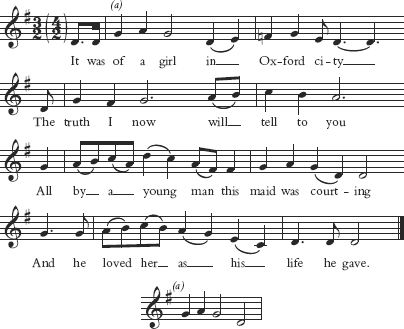
It was of a girl in Oxford city
The truth I now will tell to you
All by a young man this maid was courting
And he loved her as his life he gave.
She loved him too, but ’twas at a distance
She did not seem to be so fond
He said, ‘My dear one, why can’t we marry?
And then at once it would end all strife.’
‘Oh no, I am too young to marry
Too young to incline on a marriage bed
For when we are married then we are bound for ever
And then at once all our joys are fled.’
As she was dancing with some other
This jealousy came to his mind
All for to destroy his own true loved one
This wicked young man he was inclined.
Some poison strong which he had conceal-ed
He mixed it in a glass of wine
Then he gave it unto his own true loved one
And she drank it up most cheerfully.
But in a very few minutes after
‘Oh take me home, my dear,’ said she
‘For the glass of liquor you lately gave me
It makes me feel very ill indeed.’
‘Oh I’ve been drinking the same before you
And I’ve been taken as ill as you
So in each other’s arms we will die together’
Young men be aware of such jealousy.
129
The Oxford Girl
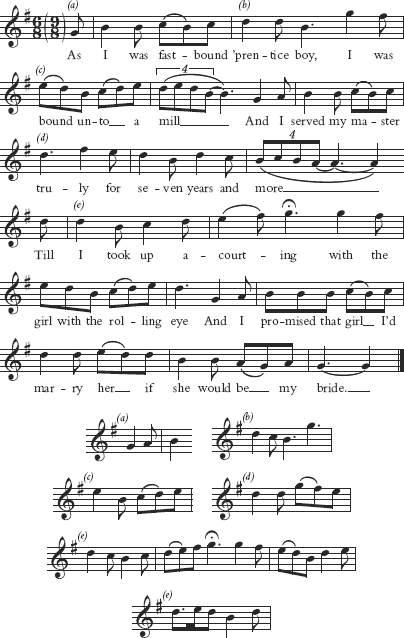
As I was fast-bound ’prentice boy, I was bound unto a mill
And I served my master truly for seven years and more
Till I took up a-courting with the girl with the rolling eye
And I promised that girl I’d marry her if she would be my bride.
So I went up to her parents’ house about the hour of eight
But little did her parents think that it should be her fate
I asked her if she’d take a walk through the fields and meadows gay
And there we told the tales of love and fixed the wedding day.
As we were walking and talking of the different things around
I drew a large stick from the hedge and knocked that fair maid down
Down on her bending knees she fell and so loud for mercy cried
‘Oh come spare the life of an innocent girl for I am not fit to die.’
Then I took her by the curly locks and I dragged her on the ground
Until I came to the riverside that flowed through Ekefield town
It ran both long and narrow, it ran both deep and wide
And there I plunged this pretty fair maid that should have been my bride.
So when I went home to my parents’ house about ten o’clock that night
My mother she jumped out of bed all for to light the light
She asked me and she questioned me, ‘Oh what stains your hands and clothes?’
And the answer I gave back to her, ‘I’ve been bleeding at the nose.’
So no rest, no rest, all that long night, no rest, no rest could I find
The fire and the brimstone around my head did shine
It was about two days after this fair young maid was found
A-floating by the riverside that flowed through Ekefield town.
Now the judges and the jurymen on me they did agree
For murdering of this pretty fair maid so hang-ed I shall be
Oh hang-ed, oh hang-ed, oh hang-ed I shall be
For murdering of this pretty fair maid, so hang-ed I shall be.
130
The Unquiet Grave
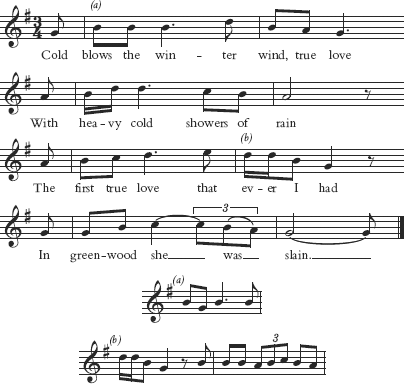
Cold blows the winter wind, true love
With heavy cold showers of rain
The first true love that ever I had
In greenwood she was slain.
I’ll do as much for my true love
As any young man may
I’ll sit and mourn all on her grave
A twelvemonth and a day.
A twelvemonth and a day being gone
The ghost began to speak
‘Why sit you here all on my grave
And never let me sleep?’
‘What dost thou want of me, true love?
What dost thou want of me?’
‘A kiss from off thy clay-cold lips
That’s all I request of thee.’
‘My lily-white lips are clayey cold
My breath smells earthy strong.’
‘And if I kiss all off your lips
Your time will not be long.’
‘My time be long, my time be short
Tomorrow or today
Sweet Christ in heaven will have my soul
And take my life away.’
‘Don’t grieve, don’t grieve for me, true love
No mourning do I crave
I must leave you and all the world
And sink down in my grave.’